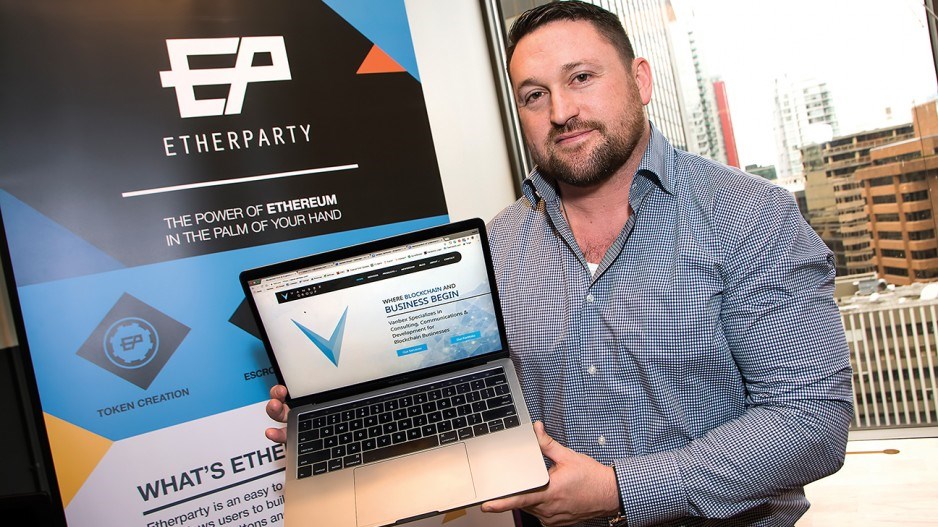Vancouver could become the centre of the exploding blockchain and cryptocurrency market, industry insiders say.
Cyptocurrencies have benefited from a surge in popularity over the past year. Matthew Unger, founder and CEO of iComply Investor Services Inc., a Vancouver-based company that developed a platform to automate regulatory and legal compliance for cryptocurrencies, called 2017 “the year of the cryptocurrency explosion.”
With growing popularity and increasing crackdowns by global regulators, many in the tech sector are asking how Vancouver and the rest of Canada can capitalize on crypto.
Cryptocurrency, a digital-based system of money, uses cryptography to securely process and verify transactions. The system relies on distributed databases called blockchains, which it uses as a public ledger comprising large numbers of decentralized transactions.
“We have a once-in-a-century opportunity to regulate blockchain technology in a favourable way, and we can be home to what will be a trillion-dollar industry,” said Kevin Hobbs, CEO of Vanbex Group, a Vancouver-based financial technology (fintech) firm. “If we get the regulators and the government on our side for the future we could be the next Silicon Valley, or bigger.”
Some of the world’s largest markets like China and South Korea have banned the sale and issuance of new cryptocurrencies. The U.S. has also warned companies that offering cryptocurrencies might violate securities laws. As a result, the country’s regulators have taken steps to limit the purchase of cryptocurrencies to accredited investors.
Hobbs said that creates an opportunity for Vancouver and other Canadian tech centres to become global hubs in the fintech and blockchain space.
Vanbex Group claims it has completed Canada’s largest initial coin offering (ICO) by raising US$33 million.
ICOs are a 21st-century way to crowdfund money for a product or service. Investors buy cryptocurrency tokens, a kind of digital currency and security, which can then be traded in online markets. The company issuing the token uses the money raised to fund its business.
Vanbex Group held its ICO in October. It attracted 4,611 contributors with an average purchase of more than US$7,100. The offering was aimed at raising funds for continued development of the company’s Etherparty digital platform, which facilitates contracts.
While Waterloo, Ontario-based messaging app creator Kik Interactive Inc.’s ICO raised more money than Etherparty, it prohibited Canadians from participating in a public sale of its new cryptocurrency token, citing a lack of clarity from the Ontario Securities Commission about whether securities laws would apply to the sale.
Vanbex’s ICO had a US$65 million market capitalization and surpassed its US$20 million fundraising goal.
However, raising millions of dollars and exceeding fundraising goals are not necessarily signs of a successful ICO.
Last year, Ethereum, a well-known cryptocurrency tech company, launched its cryptocurrency tokens with an ICO in April 2016. It raised US$168 million.
A month and a half later, Ethereum had to shut down the offering. Hackers had taken advantage of a vulnerability in Ethereum’s technology that resulted in a value loss of US$50 million. The sudden value drop caused investors to immediately sell off their holdings, tanking the cryptocurrency’s value.
“I don’t think how much money raised is itself a metric of success,” said Roham Gharegozlou, co-founder of Axiom Zen, a Vancouver-based innovation studio that does work in the cryptocurrency sector. “We see some of the most successful ICOs like Bancor and Tezos are sort of melting apart.”
Bancor’s ICO in June raised US$153 million. The starting price of Bancor’s token was US$4.49 on June 22; on November 7 it was US$1.84.
Gharegozlou compared ICOs to traditional startup financing, in that the value of the product behind them is more important than “vanity metrics.”
Cryptocurrencies can have many uses, including acting as a utility, allowing buyers to use a specific platform or product. A utility token is essentially a cryptocurrency that has a use beyond a security or debt instrument.
“Coins as utilities are absolutely the future,” Gharegozlou said.
Vanbex considers its cryptocurrency, which it calls FUEL token, a utility because it is used by the company’s Etherparty product. Etherparty’s platform enables anyone to write “smart contracts,” which allow money, property or services to be transferred across multiple blockchains.
Vanbex is not alone in its sector in B.C. BlockCAT Technologies, a Kelowna-based fintech company, opened its ICO on July 15. It raised US$7.1 million for a similar platform that also aims to ease the smart-contract process.
While Vanbex’s ICO has generated interest among investors, the company is also the target of legal action. On September 29, a former client of Vanbex, Philadelphia-based Elev3n LLC, filed a lawsuit against the company in the eastern district of Pennsylvania alleging misuse of funds and copyrighted materials. If the U.S. Securities and Exchange Commission (SEC) rules against Vanbex, it would be the first time the SEC will have treated an ICO as a security.
Vanbex would not comment on the lawsuit, but the company is suing Kip Warner, who is a former Vanbex director of engineering and a plaintiff declarant in the Elev3n lawsuit, for what it claims is defamation and breach of contract.
In July, the SEC started to strictly regulate ICOs as securities, making it nearly impossible to hold an ICO in the U.S. In September, China banned them outright.
Hobbs said those countries have opened an opportunity for Vancouver and other Canadian cities to take advantage of blockchain and related technologies.




